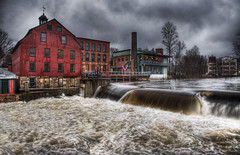 A new report from Rep. Ed Markey on the impact of climate change on New England:
A new report from Rep. Ed Markey on the impact of climate change on New England:Rep. Ed Markey (D-Mass.) today released a report that pulls together the latest studies on climate change’s negative effects on New England, painting a picture of a region already changed, and in danger of losing essential characteristics and economic engines.Stronger storms, weatier summers, slushy skiing, lower maple syrup production, more ticks, fewer of the tastiest fish ... not a pretty picture.
“If climate change continues unchecked, Hurricane Sandy won’t be our October surprise, it could be the new normal for New England, where dangerous storms and other climate effects put lives and livelihoods in danger,” said Rep. Markey, who is the top Democrat on the Natural Resources Committee and the co-author of the only climate change bill to pass a chamber of Congress. “The Perfect Storm was supposed to be a once-in-a-lifetime event, but climate change is increasing the chances of these sorts of historic extreme weather events.” [...]
“We have some of the best skiing, fishing and foliage in the world in New England, and it all is at risk due to climate change,” said Rep. Markey. “In order to save our traditions, we need more innovations that will cut the carbon pollution that is changing the very face of our planet.”
Let's drill down into what we know about climate change and Sandy as she approaches the East Coast. How is man-made global warming influencing to the storm? Two of the key ways: Warmer water and changing weather patterns. Weather Underground's Jeff Masters details the warm water's influence:
If Sandy makes landfall farther to the north near Maine and Nova Scotia, heavy rains will be the main threat, since the cold waters will weaken the storm significantly before landfall. The trees have fewer leaves farther to the north, which will reduce the amount of tree damage and power failures compared to a more southerly track. However, given that ocean temperatures along the Northeast U.S. coast are about 5°F above average, there will be an unusually large amount of water vapor available to make heavy rain. If the trough of low pressure approaching the East Coast taps into the large reservoir of cold air over Canada and pulls down a significant amount of Arctic air, the potential exists for the unusually moist air from Sandy to collide with this cold air from Canada and unleash the heaviest October rains ever recorded in the Northeast U.S., Nova Scotia, and New Brunswick. This Northeast U.S. scenario would probably cause damages near $100 million dollars.
Climate Central's Andrew Freedman explains the shifting patterns:
Such a scenario looks plausible partly due to an unusual, independent weather pattern projected for early next week: a large dome of high pressure between the Canadian Maritimes and Greenland, which may act as a block (it's tecnically known as as a “blocking high”), preventing Sandy from moving out into the open ocean, and instead helping to direct it northwestward, back toward the U.S.
Recent studies have shown that blocking highs have appeared with greater frequency and intensity in recent years, which some scientists think may be related to the loss of Arctic sea ice as a result global warming.
And this is just one impact of climate change in one corner of the country - similar stories are playing out with wildfires in the West, drought in the Midwest, and floods in the South. Yet climate change is barely mentioned on the campaign trail.
Why aren't all the Very Serious People seeking Tough Choices to Real Problems silent on climate solutions? You don't think they're only talking about the deficit as an excuse to slash or eliminate Social Security, Medicare & Medicaid to fund tax cuts for themselves because they don't actually care about current or future poor people, do you?
Why aren't all the Very Serious People seeking Tough Choices to Real Problems silent on climate solutions? You don't think they're only talking about the deficit as an excuse to slash or eliminate Social Security, Medicare & Medicaid to fund tax cuts for themselves because they don't actually care about current or future poor people, do you?

No comments:
Post a Comment